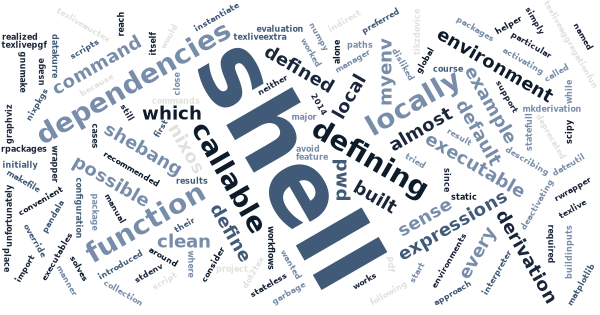Stateless Nix environments revisited
It’s almost a year, since I tried to bend Nix package manager to fit my own workflows for the first time. I disliked the recommended way of describing nix environments in global configuration and activating and deactivating them in statefull way. Back then, I worked my way around by defining a wrapper to make local nix-expressions callable executables.
Consider that deprecated.
Nix 1.9 introduced shebang support to use Nix-built interpreter in callable scripts. This alone is a major new feature and solves most of my use cases, where I wanted to define required Nix-dependencies locally, as close to their usage as possible.
Still, I do have a one more use case: For example, want to run make
with an environment, which has locally defined Nix-built dependencies.
Because the make in this particular example results just a static PDF
file, it does not make sense to make that project into a Nix derivation
itself. (Neither does it make much sense to make Makefile an
executable.)
Of course, I start with defining my dependencies into a Nix derivation,
and to make that more convenient with nix-shell, I save that into a
file called ./default.nix:
with import <nixpkgs> {}; {
myEnv = stdenv.mkDerivation {
name = "myEnv";
buildInputs = [
(texLiveAggregationFun { paths = [
texLive
texLiveAuctex
texLiveExtra
texLivePGF
];})
(rWrapper.override { packages = with rPackages; [
tikzDevice
];})
dot2tex
gnumake
graphviz
pythonPackages.dateutil
pythonPackages.matplotlib
pythonPackages.numpy
pythonPackages.scipy
];
};
}Now, I can run make in that environment in a stateless manner with:
$ nix-shell --pure --run "make clean all"Unfortunately, while that works, it’s a bit long command to type every time.
Initially, I would have preferred to be able to define local callable
script named ./make, which was possible with my old approach. Yet,
this time I realized, that I can reach almost the same result by
defining the following bash function to help:
function nix() { echo nix-shell --pure --run \"$@\" | sh; }or with a garbage collection root to avoid re-evaluation the expression on every call:
function nix() {
if [ ! -e shell.drv ]; then
nix-instantiate --indirect --add-root $PWD/shell.drv
fi
echo nix-shell $PWD/shell.drv --pure --run \"$@\" | sh;
}With this helper in place, I can run any command from the locally
defined default.nix with simply:
$ nix make clean all